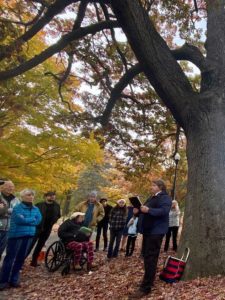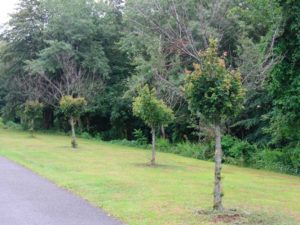Preserving the Forest City
A Brief Summary of the Heritage Tree Ordinance
By Colin Monahan

“Good trees and green spaces are like good neighbors on a crowded street. You can’t live well without them,” said Herb Adams, Parkside’s tree survey pioneer. Adams counted and cataloged each of Parkside’s 510 trees in an effort to support their conservation.
Liz Parsons and Rosanne Graef of the West End Neighborhood Association (WENA) hope to build upon Adam’s work and conduct a similar tree survey in the West End. Liz and Rosanne have been advocating for the strengthening and expansion of Portland’s Heritage Tree Ordinance, an ordinance under the Urban Forestry Program that protects trees with a special importance to the city due to their historical association or horticultural values.
Many residents are upset with developers’ neglectful cutting and removal of trees.
“The heritage tree ordinance is the only mechanism we have that would require someone who has private property who has cut something – that they shouldn’t have cut – to have to replace or pay into the Tree Trust Fund,” said Rosanne.
If a landowner cuts a heritage tree and seeks not to replant, they can opt to pay into the Tree Trust Fund, a fund established by the City to plant and maintain public street trees.
“The city’s Heritage Tree Ordinance could be improved by closing the loophole that allows developers to buy their way out of tree planting and make sure that property owners understand the values of trees,” said Adams, “to reduce it to monetary value is a sad commentary of our times.”
According to Project Canopy, about 23% of Portland sits under its urban tree canopy. But there is potential to expand its urban tree canopy an additional 27%. This would cover half of Portland’s land surface. To reduce this number to a monetary value, a 23% urban canopy cover provides an estimated $874,390 in air quality benefits annually and nearly $16 million in long-term carbon sequestration.
Currently, there are 20,000 trees in Portland and only five city employees to maintain and safeguard them.

Jeff Tarling, Portland’s City Arborist, encourages citizens to help out where they can and consider the dignity of a tree. “Its very challenging to grow infrastructure. This is not something in the fixed built environment, but you’re growing plants outdoors. That tree is actually growing in the sidewalk, and it needs a little extra care,” says Tarling. “The Heritage Tree Ordinance, whether its saving big trees or for the environmental benefits, it’s about promoting the importance of having a canopy and having street trees. I think a lot of times it gets taken for granted.”
Urban trees are immensely important to our quality of life.
Urban trees reduce stormwater runoff, provide shade for our streets, reduce wind speeds, and improve air quality. The trees in our communities are public goods that should last for generations.
“People should think about whether this tree really belongs to them if it’s a private tree? Like air and water, trees belong to everybody. We have some responsibility to each other to make pleasant healthy neighborhoods and environments,” said Rosanne.
“The turn of the last century Portland was named the Forest City – many of the historical accounts I’ve researched speak about it being this great arc of and canopy of green trees punctuated by white church steeples and towers like City Hall and the Munjoy Hill Observatory tower,” says Herb Adams, author of “Bold Vision: The History of the Portland Park System.” “I think the city has the talent for it and certainly the citizens have the desire for it. We could be the forest city again.”
A collaboration amongst Parkside, St. John/Valley Street, West End, and Western Promenade Neighborhood Associations will meet in 2023. They hope to address the crucial role trees play in making urban neighborhoods livable and healthy. Want to get involved? Contact your local neighborhood association or support the Tree Trust Fund.
Colin Monahan is a community organizer, server, and journalist. His previous work has focused on social movements in Chile, Cuba, Mexico, Vermont, New Hampshire, and Georgia. Colin believes in accessible, independent, local journalism.






3 Comments
Pingback: Avery Yale Kamila: Protecting Portland from Pesticides - The West End News
Pingback: Liz Parsons & Roseanne Graef: Re-Forest the Forest City - The West End News
Pingback: Bright Idea: Hug a Tree! And Then Plant One - The West End News